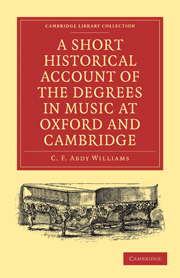 A Short Historical Account of the Degrees in Music at Oxford and Cambridge
A Short Historical Account of the Degrees in Music at Oxford and Cambridge Published online by Cambridge University Press: 05 October 2010
Music has been always more or less cultivated at the Universities by others than those taking degrees (who, as we have seen, generally resided anywhere except at Oxford or Cambridge). Although we have no definite descriptions of musical performances in early times, yet ancient inventories and account books, &c, show that the rooms of the students could not have always been without music; and it is probable that in the palmy days of English music it was cultivated here as much as elsewhere.
In Anstey's “Munimenta Academica” several inventories of the goods of Oxford students are given, among which the following items occur:—
Inventory of the goods of Master J. Cooper. 1438.
Item, una antiqua cithera.
Item, una “lute ‘n fracta.
Inventory of Symon Beryngton, Scholar. 1448.
Item, unum hornpipe.
Inventory of Sir John Lydberg.
Item, a lewt.
Inventory of John Hosear. 1463.
Item, an harpe.
In 1452 Robert the Harpmaker finds sureties that he will not molest Master J. Van, and that he will not enter the house of John Fytz-John at unseasonable hours. That a harpmaker could find a means of livelihood at Oxford shows that there must have been a demand for instruments.
Frequent mention is also made of organs in Chapels and in the University Church. In 1489 an organ was set up in St. John's Chapel, at a cost of £28. It survived the Commonwealth, and was not pulled down till 1677. In 1492 the following entries occur in the books of St. Mary's Church:—
“Paid for mending the bellows of the organs, iid.”
“Received of Mr. Waller towards the organs, xxs.”
To save this book to your Kindle, first ensure no-reply@cambridge.org is added to your Approved Personal Document E-mail List under your Personal Document Settings on the Manage Your Content and Devices page of your Amazon account. Then enter the ‘name’ part of your Kindle email address below. Find out more about saving to your Kindle.
Note you can select to save to either the @free.kindle.com or @kindle.com variations. ‘@free.kindle.com’ emails are free but can only be saved to your device when it is connected to wi-fi. ‘@kindle.com’ emails can be delivered even when you are not connected to wi-fi, but note that service fees apply.
Find out more about the Kindle Personal Document Service.
To save content items to your account, please confirm that you agree to abide by our usage policies. If this is the first time you use this feature, you will be asked to authorise Cambridge Core to connect with your account. Find out more about saving content to Dropbox.
To save content items to your account, please confirm that you agree to abide by our usage policies. If this is the first time you use this feature, you will be asked to authorise Cambridge Core to connect with your account. Find out more about saving content to Google Drive.